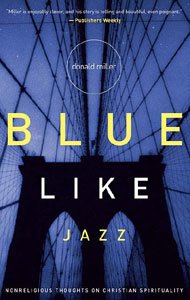Blue Like Jazz

I recently had to write a little reflection on the book Blue Like Jazz by Donald Miller for one of my doctor of ministry courses. I know many from the church read it this summer, and so I thought I'd post my paper for you all to read if you'd like. If you haven't read the book -- it is a great read and a wonderful evangelism tool. Here it is...
A friend remarked that Blue Like Jazz was a book that “described the Christian faith without using Christian language.” It’s true -- Miller’s journalistic account of Christian spirituality lived in a postmodern world is Christian in essence without feeling Christian in packaging. It is a brilliant piece of work, and I loan it out whenever I can. In fact, many of our church small groups went through it this summer and (by in large) loved it.
There are a number of things I appreciate about the book. First, it carries with it a sense of authenticity that comes from sharing one’s struggles and doubts. Miller is very open and honest about his own flaws, shortcomings, and incompletion. He writes candidly about his periods of self-righteousness, his moments of posturing, and his falls from grace.
Yet, instead of tarnishing his Christian witness, these stories make Miller more real and believable. Much like the Scriptures which are filled with flawed individuals, Miller is a struggling believer who knows all too well that he doesn’t have it all together. His humility and willingness to wrestle with God in real life rings true.
Secondly, Miller is constantly finding God in the murkiest of environments. He has friends who cuss, smoke, protest, are hippies, live in moral laxity, and even attend Reed College (the college where people are most likely to ignore God per The Princeton Review). Yet, instead of judging them by their sins or by the environment in which they live and thus staying away from them, Miller is able to see under these “flaws” to the people and places that are on a quest for truth. If Blue Like Jazz were a novel, the heroes would definitely be these cast of sinners. They are the ones who shine light in the darkness (the “darkness” poignantly enough being the religious elite). And in a strange and beautiful way, it is these cast of ragamuffins who help Miller grow in his Christian faith most of all (or as he calls it, “Christian spirituality”). Their stories of finding Christ and their practice of the Christian virtues (whether they are really Christians or not) compel Miller to go forward in his own faith in Christ. This is not just brilliant insight, but also compelling evangelism in a world suspect of religion and the institution of faith.
Finally, I love it that Miller never resolves his faith completely. He is constantly searching, wrestling, and ultimately uncomfortable saying he is certain about anything, except maybe Love as he has experienced it in encounters with Jesus. Lack of foundation is a post-modern principle, and Miller happily lives in it. You get the sense that Miller sees himself and his faith as a constant work in progress – and he is fine with that (albeit uncomfortable in the process).
The reason I love this so much is that I see myself and my faith in much the same way. It is the living Word, Jesus Christ who I want to define my reality and who walks with me into the future. Because of that, I feel like I have the privilege to wrestle with my faith, to question, and to learn as I go. I don’t mind the dissonance, and in fact, if there isn’t some dissonance, I wonder if I am missing something.
Christian spirituality is not as much a set of doctrines and beliefs as it is a lived experience with the risen Christ. Miller’s book sets this experience in motion in a way my generation can understand and latch on to. I am grateful.


1 Comments:
Hi, Jeff.
I won't be anonymous because you know who I am - the communication coordinator at our church! Just wanted to say how impressed I am by look and content of your "blog." I have not had a chance to read ALL your entries, but I like the variety of subjects you tackle. I hope you won't hold it against me if I admit that I actually know a professor at Reed College (that infamous "godless" place). I never knew it was such a wasteland of spirituality. As a suggestion for future blog topics, you might illuminate your readers on how people in the Northwest often turn to nature - not church -for their spiritual needs. If you have lived in the Northwest, this fact will not be surprising. I found that Northwesterners were independent thinkers who basically shunned any "institutions" - even church. In general, they are NOT joiners; don't you agree? Anyway, good luck with your future columns, I mean, "blogs."
By Anonymous, at 9:32 AM
Anonymous, at 9:32 AM
Post a Comment
<< Home